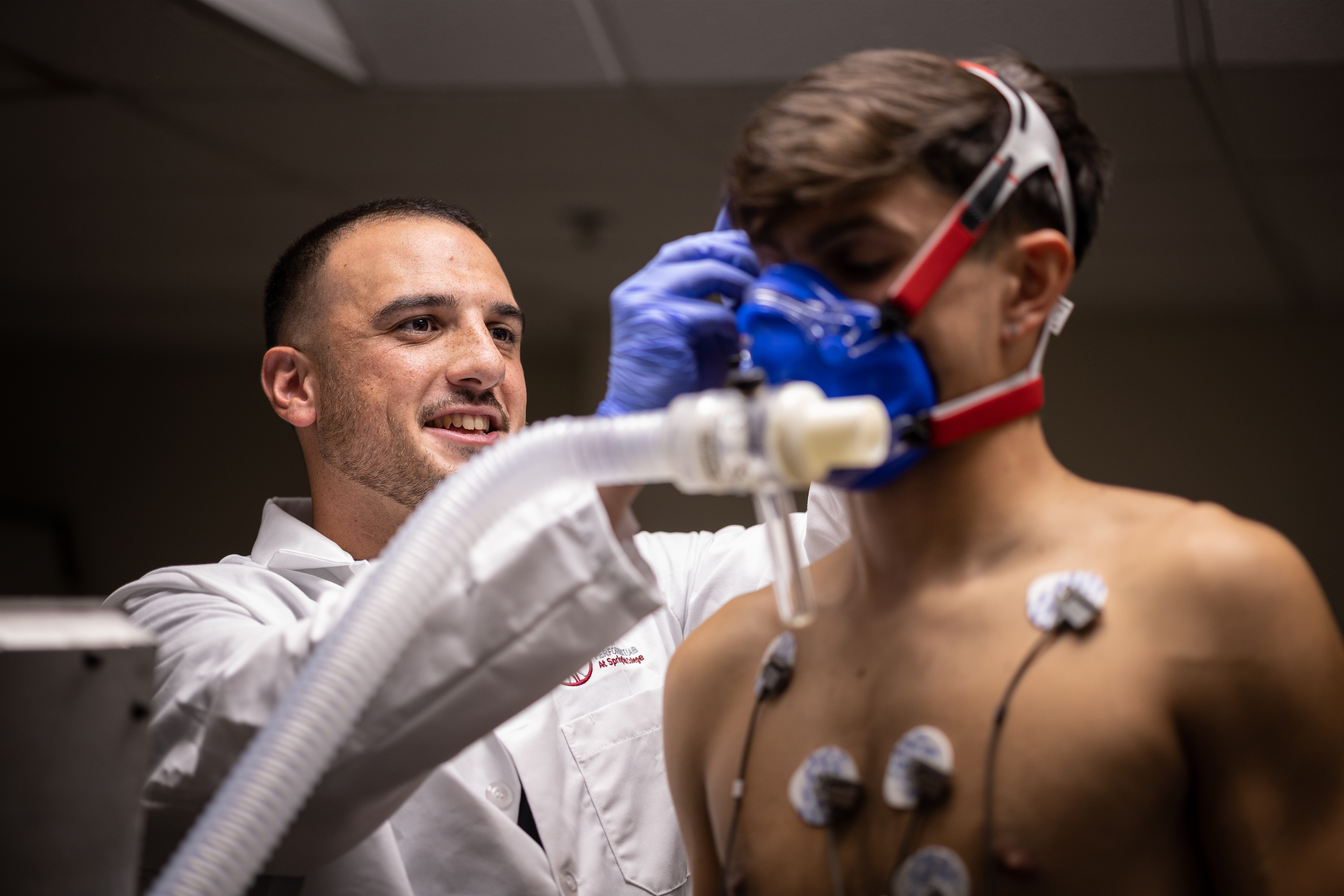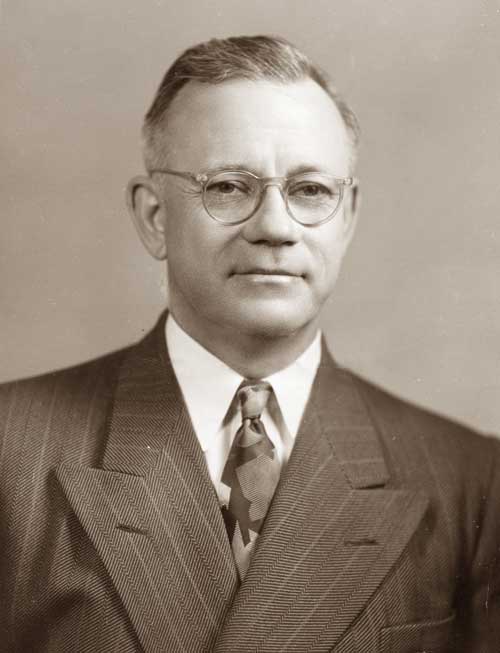Peter V. Karpovich Lecture

Professor of Exercise Science, Program Director of Exercise Physiology
In this lecture in honor of Dr. Karpovich, Samuel Headley, PhD, will highlight some of the important exercise physiology research that he completed as a faculty member at Springfield College. Headley will then share the relevant exercise physiology research that his research groups have collaborated on at the College since 1993 to the present.
This research covers lifestyle interventions, such as diet and exercise training, to treat chronic, noncommunicable diseases. These chronic conditions particularly impact minority health (hypertension and chronic kidney disease). Headley will end his remarks with an exciting update on research studies planned on campus, which promise to engage the community, students, and colleagues.
Wednesday, October 11, 2023, 6:30 p.m.
For questions or more information, contact Laura Feeley at lfeeley@springfield.edu or (413) 748-3413. If you have a disability and require reasonable accommodations to participate in this event, contact Laura by Friday, October 1 to discuss your accessibility needs.
Past Lecturers
- 1973 - Dr. Elsworth R. Buskirk, “Coronary Heart Disease”
- 1974 - Dr. Jean Mayer, “Nutrition and Health Risks”
- 1975 - Dr. David H. Clarke, “The Muscle in Physical Performance and Fatigue”
- 1976 - Dr. David B. Dill, “Responses of Men and Women to Exercise in Desert Heat”
- 1977 - Dr. Benjamin Ricci, “Pitfalls and Potentials of Stress Testing”
- 1978 - Dr. Ralph F. Goldman, “Physically Fit – For What?”
- 1979 - Dr. David L. Costill, “Optimizing Athletic Performance”
- 1980 - Dr. Charles Tipton, “Animal Models and Their Lessons for Exercise Physiology”
- 1981 - Dr. Michael J. Pollock, “Exercise Prescription: Guidelines and New Concepts”
- 1982 - Dr. Howard G. Knuttgen, “Muscle Contractions, Physiological Response and Sports Conditioning”
- 1983 - Dr. G. William Hettler, III, “Evolution of the Health Fitness Movement”
- 1984 - Dr. Russell E. Pate, “Physical Activity and Health: Implications for Public Policy”
- 1985- Dr. Vassilis Kissouras, “Limits of Human Performance: What We Have Learned from the Study of Twins”
- 1986- Dr. William P. Morgan, “Psychobiological Perspectives in Sports Psychology”
- 1987 - Dr. Marlene J. Adrian, “Research and the Real World of Human Movement”
- 1988 - Dr. Klaus Volker, “Sports and Hypertension: Risks and Benefits”
- 1990- Dr. Jackie Puhl, “Footprints: The Past, Present and Future in Exercise Physiology”
- 1991 - Dr. Roberta J. Park, “Athletes and Their Training in Britain and America,1800-1924: Social, Cultural, and Physiological Considerations”
- 1993 - Dr. Mimi Murray, “The Professions from the Perspective of the AAHPERD Presidency”
- 1994 - Dr. James A. Peterson, “Yes, You Can – Enabling Young Women to Reach Their True Physical Potential”
- 1995 - Dr. Albert M. Paolone, “Gender and Performance in a Changing Society”
- 1996 - Grant Allen Peacock, III, “Sports Fitness for the Disabled”
- 1997 - Dr. Glenn M. Wong, “Sport Law and Sport Management in the 21st Century”
- 1998- Mel Zuckerman, “Tomorrow’s Paradigms for Healthy Living”
- 1999 - Dr. Carl Gabbard, “Your Child’s Brain: Windows of Opportunity – A Multi Sensory Approach to Learning”
- 2000 - Dr. Anita White, “Women in the Olympics: One Hundred Years”
- 2001 - Dr. John Lucas, “The Olympic Games in the 21st Century”
- 2003 - Dr. Frank Pyke, “Maximizing Potential in High Performance Sport”
- 2004 - Dr. William Kraemer, “The Physiology of Resistance Training”
- 2005 - Dr. Andrew Zimbalist, “Sports, Stadium, and Economic Development
- 2006 - Dr. Jack H. Wilmore, “The Obesity Epidemic: Focus on Treatment or Prevention”
- 2007 - Marjorie J. Albohm, “Securing Athletic Training as a Health Care Profession – What Will It Take?”
- 2007 - Dr. Lawrence F. Locke, “Redefining the Role of the Physical Education Teacher: Radical Changes to Meet New Demands”
- 2008 - Dr. Kris Berg, “Metabolism of Non-steady State Work and Sport”
- 2008 - Dr. John J. Ratey, “The Impact of Exercise on Learning”
- 2009 - Dr. Arleigh Reynolds, “Relationship between Nutrition and Performance in Sled Dogs – A Study in Extremes”
- 2010 - Dr. Mimi Murray, “Celebration of 125 Years of AAHPERD and Springfield College”
- 2011 - Dr. Lynn Couturier, “Gazing Into the Crystal Ball: The Future of Physical Education”
- 2012 - Dr. Robert W. Hamill, “Physical Activity and Neurorestoration: Spirit, Mind, and Body Revisited”
- 2013 - Nancy Hogshead-Makar, “Title IX: We Won, Right? So, Why the Stubborn Disparities in Athletics?”
- 2014 - Vincent J. Paolone, EdD, FASCM, “The Karpovich Legacy is Alive and Well”
- 2015 - Robert D. Kersey, PhD, ATC, “Sport & Exercise Ergogenics: Who cares?”
- 2016 - Ronald W. Davis, PhD, “Redefine, Reunite, Re-enter: Promoting Health and Well-being through Physical Activity for Non-military and Military Persons with Disability”
- 2017 - I-Min Lee, MD, MPH, ScD, FACSM, "Physical Activity and Health: How Much Exercise is Enough?"
- 2018 - Bradley C. Nindl, PhD, "Leveraging Exercise Science and Physical Education to Optimize Military Physical Performance: Science and Strategies to Bolster Military Readiness and National Security"
- 2019 - Judith Rink, PhD, "Physical Education and Physical Activity: Issues and Future Implications"
- 2021 - Mary Jane De Souza ’80, G’84, PhD, FACSM, "Her Life Depends on It: Lessons Learned about Keeping Exercising Women Healthy"
- 2022 - Nefertiti A. Walker, PhD, "Building Inclusive Sport Culture through the Study of Sport Exclusion"
- 2023 - Samuel A. E. Headley, PhD, "Exercise Physiology Research at Springfield College: Then and Now"
About Peter V. Karpovich
 Peter V. Karpovich, MD, a native of Luga, Russia, received a medical degree from the State Military Medical Academy, Leningrad, Russia, in 1919. He served as a physician at the Red Cross Hospital, Kotelnich, Russia, in 1919, and was appointed surgeon at the Military School of Physical Education, Etaterinburg, Russia in 1921. He later served as a surgeon-physician in Kamushloff, Russia, and in Leningrad.
Peter V. Karpovich, MD, a native of Luga, Russia, received a medical degree from the State Military Medical Academy, Leningrad, Russia, in 1919. He served as a physician at the Red Cross Hospital, Kotelnich, Russia, in 1919, and was appointed surgeon at the Military School of Physical Education, Etaterinburg, Russia in 1921. He later served as a surgeon-physician in Kamushloff, Russia, and in Leningrad.
Dr. Karpovich joined the Springfield College faculty in 1927 as professor of physiology. He assumed duties as director of health education at Springfield College in 1947 and was appointed research professor of physiology in 1955.
Dr. Karpovich authored more than 130 scientific articles on physical training and its effects on energy expenditure and athletics. His books include Adventures in Artificial Respiration, Weight Training in Athletics and Physiology of Muscular Activity. Among his numerous accomplishments in research physiology during his career at Springfield College was the invention of electrogoniometer, a device that automatically measures and records angles formed in human joints. Dr. Karpovich completed extensive studies in relation to the electrogoniometer and human movement through grants from the National Institute of Arthritis and Metabolic Diseases and the U.S. Government.
Dr. Karpovich was a fellow of the American Academy of Physical Education and the American Association for the Advancement of Science. He was a member of the American Association of Health, Physical Education, and Recreation, as well as the Royal Society of Health, the American Physiology Society, and the New York Academy of Science. Dr. Karpovich, and his wife, Dr. Josephine Rathbone, were among the founders of the American College of Sports Medicine (ACSM) and he was chairman of its research committee. He was president of the ACSM in 1961-62 and was presented the organization’s honor award. Dr. Karpovich is considered by many to be the father of exercise physiology in the United States.

